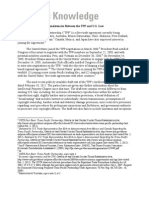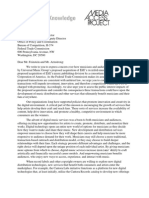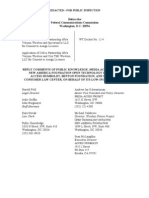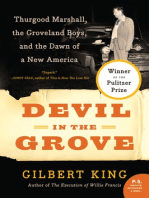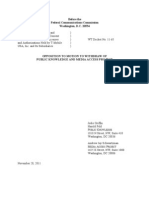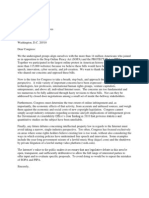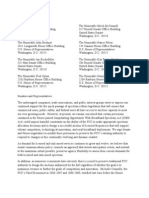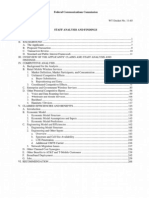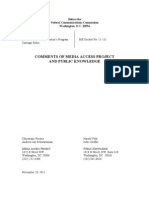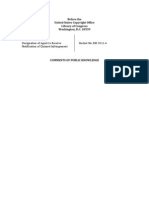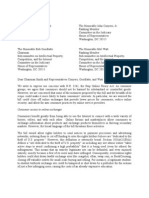Professional Documents
Culture Documents
Leading Web Companies' Letter Against SOPA
Uploaded by
Carl Franzen0 ratings0% found this document useful (0 votes)
344 views2 pagesLetter from nine leading Web companies urging Senat Judiciary Committee Leaders not to pass the Stop Online Privacy Act. Signed by Google, Facebook, Twitter, Zynga, eBay, AOL, Yahoo, LinkedIn and Mozilla.
Copyright
© Attribution Non-Commercial (BY-NC)
Available Formats
PDF, TXT or read online from Scribd
Share this document
Did you find this document useful?
Is this content inappropriate?
Report this DocumentLetter from nine leading Web companies urging Senat Judiciary Committee Leaders not to pass the Stop Online Privacy Act. Signed by Google, Facebook, Twitter, Zynga, eBay, AOL, Yahoo, LinkedIn and Mozilla.
Copyright:
Attribution Non-Commercial (BY-NC)
Available Formats
Download as PDF, TXT or read online from Scribd
0 ratings0% found this document useful (0 votes)
344 views2 pagesLeading Web Companies' Letter Against SOPA
Uploaded by
Carl FranzenLetter from nine leading Web companies urging Senat Judiciary Committee Leaders not to pass the Stop Online Privacy Act. Signed by Google, Facebook, Twitter, Zynga, eBay, AOL, Yahoo, LinkedIn and Mozilla.
Copyright:
Attribution Non-Commercial (BY-NC)
Available Formats
Download as PDF, TXT or read online from Scribd
You are on page 1of 2
November 15, 2011
The Honorable Pat Leahy
Chairman
Committee on the |udiciary
United States Senate
Washington, DC 20510
The Honorable Chuck Crassley
Ranking Member
Committee on the |udiciary
United States Senate
Washington, DC 20510
The Honorable Lamar Smith
Chairman
Committee on the |udiciary
House of Representatives
Washington, DC 20515
The Honorable |ohn Conyers, |r.
Ranking Member
Committee on the |udiciary
House of Representatives
Washington, DC 20515
Dear Chairman Leahy, Ranking Member Crassley, Chairman Smith and Ranking Member Conyers:
The undersigned nternet and technology companies write to express our concern with legislative
measures that have been introduced in the United States Senate and United States House of
Representatives, S. 968 (the "PROTECT P Act") and H.R. 3261 (the "Stop Online Piracy Act").
We support the bills' stated goals -- providing additional enforcement tools to combat foreign "rogue"
websites that are dedicated to copyright infringement or counterfeiting. Unfortunately, the bills as
drafted would expose law-abiding U.S. nternet and technology companies to new uncertain liabilities,
private rights of action, and technology mandates that would require monitoring of web sites. We
are concerned that these measures pose a serious risk to our industry's continued track record of
innovation and |ob-creation, as well as to our Nation's cybersecurity. We cannot support these bills as
written and ask that you consider more targeted ways to combat foreign "rogue" websites dedicated
to copyright infringement and trademark counterfeiting, while preserving the innovation and
dynamism that has made the nternet such an important driver of economic growth and |ob creation.
One issue merits special attention. We are very concerned that the bills as written would seriously
undermine the eective mechanism Congress enacted in the Digital Millenium Copyright Act (DMCA)
to provide a safe harbor for nternet companies that act in good faith to remove infringing content
from their sites. Since their enactment in 1998, the DMCA's safe harbor provisions for online service
providers have been a cornerstone of the U.S. nternet and technology industry's growth and
success. While we work together to nd additional ways to target foreign rogue sites, we should not
|eopardize a foundational structure that has worked for content owners and nternet companies alike
and provides certainty to innovators with new ideas for how people create, nd, discuss, and share
information lawfully online.
We are proud to be part of an industry that has been crucial to U.S. economic growth and |ob
creation. A recent McKinsey Clobal nstitute report found that the nternet accounts for 3.4 percent of
CDP in the 13 countries that McKinsey studied, and, in the U.S., the nternet's contribution to CDP is
even larger. f nternet consumption and expenditure were a sector, its contribution to CDP would be
greater than energy, agriculture, communication, mining, or utilities. n addition, the nternet industry
has increased productivity for small and medium-sized businesses by 10%. We urge you not to risk
either this success or the tremendous benets the nternet has brought to hundreds of millions of
Americans and people around the world.
We stand ready to work with the Congress to develop targeted solutions to address the problem of
foreign "rogue" websites.
Thank you in advance for your consideration.
AOL nc.
eBay nc.
Facebook nc.
Coogle nc.
Linkedn Corporation
Mozilla Corp.
Twitter, nc.
Yahoo! nc.
Zynga Came Network
You might also like
- The Subtle Art of Not Giving a F*ck: A Counterintuitive Approach to Living a Good LifeFrom EverandThe Subtle Art of Not Giving a F*ck: A Counterintuitive Approach to Living a Good LifeRating: 4 out of 5 stars4/5 (5794)
- Public Knowledge Reply Comments To Motion Picture Association of America (MPAA)Document22 pagesPublic Knowledge Reply Comments To Motion Picture Association of America (MPAA)Public KnowledgeNo ratings yet
- Shoe Dog: A Memoir by the Creator of NikeFrom EverandShoe Dog: A Memoir by the Creator of NikeRating: 4.5 out of 5 stars4.5/5 (537)
- Inconsistencies Between The TPP and U.S. LawDocument11 pagesInconsistencies Between The TPP and U.S. LawPublic KnowledgeNo ratings yet
- Letter To FTC Concerning UMG's Proposed Acquisition of EMIDocument4 pagesLetter To FTC Concerning UMG's Proposed Acquisition of EMIPublic KnowledgeNo ratings yet
- The Yellow House: A Memoir (2019 National Book Award Winner)From EverandThe Yellow House: A Memoir (2019 National Book Award Winner)Rating: 4 out of 5 stars4/5 (98)
- It Will Be Awesome If They Don'T Screw It UpDocument16 pagesIt Will Be Awesome If They Don'T Screw It UpJeferson ChristhNo ratings yet
- Hidden Figures: The American Dream and the Untold Story of the Black Women Mathematicians Who Helped Win the Space RaceFrom EverandHidden Figures: The American Dream and the Untold Story of the Black Women Mathematicians Who Helped Win the Space RaceRating: 4 out of 5 stars4/5 (895)
- Public Knowledge Responds To Movie Industry On DVD CopyingDocument522 pagesPublic Knowledge Responds To Movie Industry On DVD CopyingPublic KnowledgeNo ratings yet
- The Hard Thing About Hard Things: Building a Business When There Are No Easy AnswersFrom EverandThe Hard Thing About Hard Things: Building a Business When There Are No Easy AnswersRating: 4.5 out of 5 stars4.5/5 (344)
- PK Reply Comments in Verizon/SpectrumCoDocument43 pagesPK Reply Comments in Verizon/SpectrumCoPublic KnowledgeNo ratings yet
- The Little Book of Hygge: Danish Secrets to Happy LivingFrom EverandThe Little Book of Hygge: Danish Secrets to Happy LivingRating: 3.5 out of 5 stars3.5/5 (399)
- PK Summary of Spectrum BillsDocument25 pagesPK Summary of Spectrum BillsPublic KnowledgeNo ratings yet
- Grit: The Power of Passion and PerseveranceFrom EverandGrit: The Power of Passion and PerseveranceRating: 4 out of 5 stars4/5 (588)
- Verizon SpectrumCo PetitionDocument60 pagesVerizon SpectrumCo PetitionPublic KnowledgeNo ratings yet
- The Emperor of All Maladies: A Biography of CancerFrom EverandThe Emperor of All Maladies: A Biography of CancerRating: 4.5 out of 5 stars4.5/5 (271)
- Senator Cantwell: Payroll Tax Cut and Public Safety SpectrumDocument2 pagesSenator Cantwell: Payroll Tax Cut and Public Safety SpectrumPublic KnowledgeNo ratings yet
- Devil in the Grove: Thurgood Marshall, the Groveland Boys, and the Dawn of a New AmericaFrom EverandDevil in the Grove: Thurgood Marshall, the Groveland Boys, and the Dawn of a New AmericaRating: 4.5 out of 5 stars4.5/5 (266)
- Letter To Conferees Supporting Unlicensed Spectrum 02-09-12Document6 pagesLetter To Conferees Supporting Unlicensed Spectrum 02-09-12Public KnowledgeNo ratings yet
- Never Split the Difference: Negotiating As If Your Life Depended On ItFrom EverandNever Split the Difference: Negotiating As If Your Life Depended On ItRating: 4.5 out of 5 stars4.5/5 (838)
- Public Interest Spectrum Letter WaxmanDocument2 pagesPublic Interest Spectrum Letter WaxmanPublic KnowledgeNo ratings yet
- A Heartbreaking Work Of Staggering Genius: A Memoir Based on a True StoryFrom EverandA Heartbreaking Work Of Staggering Genius: A Memoir Based on a True StoryRating: 3.5 out of 5 stars3.5/5 (231)
- Opposition To Motion To Withdraw of Public Knowledge and Media Access ProjectDocument10 pagesOpposition To Motion To Withdraw of Public Knowledge and Media Access ProjectPublic KnowledgeNo ratings yet
- Title VI: Public Safety Communications & Electromagnetic Spectrum AuctionsDocument147 pagesTitle VI: Public Safety Communications & Electromagnetic Spectrum AuctionsPublic KnowledgeNo ratings yet
- On Fire: The (Burning) Case for a Green New DealFrom EverandOn Fire: The (Burning) Case for a Green New DealRating: 4 out of 5 stars4/5 (73)
- Public Knowledge-Internet Letter To CongressDocument2 pagesPublic Knowledge-Internet Letter To CongressPublic Knowledge100% (1)
- Elon Musk: Tesla, SpaceX, and the Quest for a Fantastic FutureFrom EverandElon Musk: Tesla, SpaceX, and the Quest for a Fantastic FutureRating: 4.5 out of 5 stars4.5/5 (474)
- Public Knowledge Comments in The Copyright Office DMCA ProceedingDocument24 pagesPublic Knowledge Comments in The Copyright Office DMCA ProceedingPublic KnowledgeNo ratings yet
- Team of Rivals: The Political Genius of Abraham LincolnFrom EverandTeam of Rivals: The Political Genius of Abraham LincolnRating: 4.5 out of 5 stars4.5/5 (234)
- Democratic and Republican Senators Urge Smart, Inclusive Spectrum ReformDocument2 pagesDemocratic and Republican Senators Urge Smart, Inclusive Spectrum ReformPublic KnowledgeNo ratings yet
- The World Is Flat 3.0: A Brief History of the Twenty-first CenturyFrom EverandThe World Is Flat 3.0: A Brief History of the Twenty-first CenturyRating: 3.5 out of 5 stars3.5/5 (2259)
- Comments of PK, EFF, & FMC: Remedies For Small Copyright ClaimsDocument10 pagesComments of PK, EFF, & FMC: Remedies For Small Copyright ClaimsPublic KnowledgeNo ratings yet
- CEO of Webs - Com Opposes SOPA - Letter To Maryland Governor and Congressional DelegationDocument2 pagesCEO of Webs - Com Opposes SOPA - Letter To Maryland Governor and Congressional DelegationPublic KnowledgeNo ratings yet
- Groups Urge Congress To Preserve FCC Flexibility in Spectrum AllocationDocument3 pagesGroups Urge Congress To Preserve FCC Flexibility in Spectrum AllocationPublic KnowledgeNo ratings yet
- Groups Urge Congress To Preserve FCC Flexibility in Spectrum Allocation (Final Version)Document3 pagesGroups Urge Congress To Preserve FCC Flexibility in Spectrum Allocation (Final Version)Public KnowledgeNo ratings yet
- FCC Staff AnalysisDocument157 pagesFCC Staff AnalysisPublic KnowledgeNo ratings yet
- The Unwinding: An Inner History of the New AmericaFrom EverandThe Unwinding: An Inner History of the New AmericaRating: 4 out of 5 stars4/5 (45)
- Public Knowledge and Media Access Project - Comment On FCC Carriage RulesDocument30 pagesPublic Knowledge and Media Access Project - Comment On FCC Carriage RulesPublic KnowledgeNo ratings yet
- Public Knowledge and Media Access Project Comments On Encryption of Cable's Basic TierDocument16 pagesPublic Knowledge and Media Access Project Comments On Encryption of Cable's Basic TierPublic KnowledgeNo ratings yet
- Public Knowledge Amicus Brief in John Wiley & Sons, Inc. v. Kirtsaeng Petition For CertiorariDocument34 pagesPublic Knowledge Amicus Brief in John Wiley & Sons, Inc. v. Kirtsaeng Petition For CertiorariPublic KnowledgeNo ratings yet
- The Gifts of Imperfection: Let Go of Who You Think You're Supposed to Be and Embrace Who You AreFrom EverandThe Gifts of Imperfection: Let Go of Who You Think You're Supposed to Be and Embrace Who You AreRating: 4 out of 5 stars4/5 (1090)
- ATT Transcript 12-09-11Document88 pagesATT Transcript 12-09-11Public KnowledgeNo ratings yet
- Reply Comments of Public Knowledge Re: AT&T/T-MobileDocument44 pagesReply Comments of Public Knowledge Re: AT&T/T-MobilePublic KnowledgeNo ratings yet
- PK Comments-US Copyright Office-DMCA AgentDocument15 pagesPK Comments-US Copyright Office-DMCA AgentPublic KnowledgeNo ratings yet
- Public Interest Groups SOPA LetterDocument2 pagesPublic Interest Groups SOPA LetterPublic KnowledgeNo ratings yet
- The Sympathizer: A Novel (Pulitzer Prize for Fiction)From EverandThe Sympathizer: A Novel (Pulitzer Prize for Fiction)Rating: 4.5 out of 5 stars4.5/5 (120)
- SOPA House Letter From Law ProfessorsDocument16 pagesSOPA House Letter From Law ProfessorsPublic KnowledgeNo ratings yet
- Consumer Federation of America, Consumer's Union and US PIRG SOPA LetterDocument2 pagesConsumer Federation of America, Consumer's Union and US PIRG SOPA LetterPublic KnowledgeNo ratings yet
- Her Body and Other Parties: StoriesFrom EverandHer Body and Other Parties: StoriesRating: 4 out of 5 stars4/5 (821)



